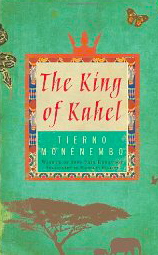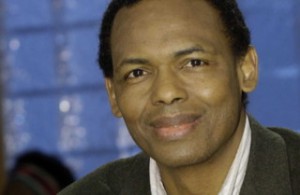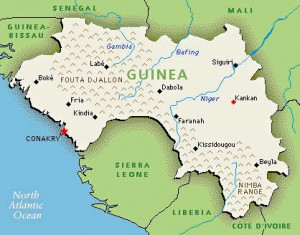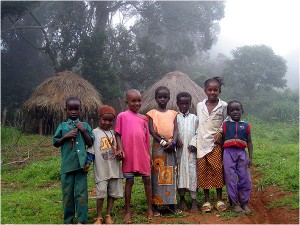Note: This novel was WINNER of France’s Prix Renaudot in 2008.
“[Fouta Djallon] was Fula country: though it was theoretically unacceptable to betray friends, it was common practice to spy on them and not unknown to sprinkle a bit of poison in their meal or turn a friendly slap on the back into a dagger thrust between the shoulder blades…[Olivier de Sanderval] knew this country now and he wanted it; he needed it. It had become his drug.”
Author Tie rno Monenembo recreates the story of Aime Olivier de Sanderval, an almost forgotten Frenchman who followed a childhood dream by going to remote Africa in 1879, describing Olivier’s experiences in Guinea just before it became an unwilling colony of France. Olivier was not representing the government when he arrived in Guinea and did not believe in colonization in the traditional sense. An explorer with an almost mystical sense of destiny, he wanted to build a railroad from the beautiful hill country in the center of the country to the coast so that he could create trading posts and ultimately claim for himself the plateau of Fouta Djallon, “a land of rushing water and fruit, pure milk and wise men! The land that quenches your thirst.”
rno Monenembo recreates the story of Aime Olivier de Sanderval, an almost forgotten Frenchman who followed a childhood dream by going to remote Africa in 1879, describing Olivier’s experiences in Guinea just before it became an unwilling colony of France. Olivier was not representing the government when he arrived in Guinea and did not believe in colonization in the traditional sense. An explorer with an almost mystical sense of destiny, he wanted to build a railroad from the beautiful hill country in the center of the country to the coast so that he could create trading posts and ultimately claim for himself the plateau of Fouta Djallon, “a land of rushing water and fruit, pure milk and wise men! The land that quenches your thirst.”
During his studies in Lyon, Olivier had become a devout believer in evolution, including the idea that evolution controlled all aspects of life, not just the future of animal life. It was his evolutionary destiny to go to Africa, he felt, since Europe’s genes were “worn thin,” and Negro blood could make Africa the center of a new civilization. He saw himself as the future king of this Africa–a benevolent king, of course, working peacefully from Fouta Djallon in the Guinea highlands with the many tribes which he intended to befriend. There civilization would survive another Ice Age which he expected in the immediate future.

The realities of tribal Guinea, with its internecine wars, its completely different cultures, and its total connection to the land intrude immediately upon his arrival, however. Naively, he tries to befriend the various groups and the leaders that he meets as he travels from the coast to central Guinea, but he has no conception of the long, historical rivalries among groups, of their experiences with previous white visitors, or of their ways of governing. The Fula, especially, considered cunning a noble sport. “Here you were born crafty or cursed; king or no one at all.” Olivier must play a game in which he is unsure of the rules, or die. He cannot rely on any of the people he hires, and he must beware of the “friends” he makes along the way, many of whom may be craftier than he.
His relationship with the French government is at least as traumatic. Determined to form a colony, the French government is more interested in exerting power than in winning friends among the populace–the French fear that the British will gain this land first, and they want all the rights for themselves. The government’s representatives work at cross purposes to Olivier and have far more power than he does. “You are nothing  more than a citizen on a lark,” one French rival declares. Over the next twenty years, both in Guinea and back in France, where he visits his family, Olivier tries to maintain a dream that he sees becoming smaller and smaller as he becomes more and more isolated, both physically and intellectually.
more than a citizen on a lark,” one French rival declares. Over the next twenty years, both in Guinea and back in France, where he visits his family, Olivier tries to maintain a dream that he sees becoming smaller and smaller as he becomes more and more isolated, both physically and intellectually.
An adventure story with an unusual main character and setting, The King of Kahel tells the complex story of Olivier from an unusual point of view. Author Tierno Monenembo, himself a descendant of the Fulas with whom Olivier had to contend, explains that “Aimé Victor Olivier de Sanderval met my ancestors: he went off to my country in particular circumstances. His approach to Africa is markedly different from that of other Europeans, for they came as conquerors. Aimé Victor Olivier de Sanderval did not view this country merely from the outside. There was something of an insider’s approach about his attitude, which almost made a Fulani of him, one of us.”* (See citation and interview in Notes.) Despite this recognition of Olivier’s difference from the colonial powers, however, the author also shows Olivier’s weaknesses and his arrogance. He was clearly a product of the nineteenth century, with the same sense of superiority toward local populations that all the colonial governments possessed, though he had a certain sense of altruism which they lacked.

Fascinating for those who enjoy novels based on the lives of real people, The King of Kahel may be more successful for its research than it is as a novel. Its style is distanced and formal, somewhat like real narratives of the nineteenth century, and Olivier de Sanderval himself is not a character with whom most readers will identify. His goals and actions are not completely benign as he deals with an enormous number of hostile local characters and equally hostile representatives of the French government. His dealings with a large cast of characters, some of them with similar names, are complicated and often difficult to keep in perspective, and the eight years he spends in France between his first and second trips to Africa diffuse the action and make the writer’s purpose and its major themes less clear. The King of Kahel offers an unusual look at a most unusual character during a turning point in the history of Guinea, however, and as a record of this time, it provides unique insights into colonial expansion, its damage to local cultures, and its lasting legacy.
Photos, in order: The author’s photo and biography appear on http://blog.francetv.fr
The map of Guinea is from http://themoderatevoice.com
A photo of Fouta Djallon’s children by Michel Tendil in 2005 appears on http://en.wikipedia.org
*The quotation of Tierno Monenembo is from an interview which appears on www.humaniteinenglish.com
